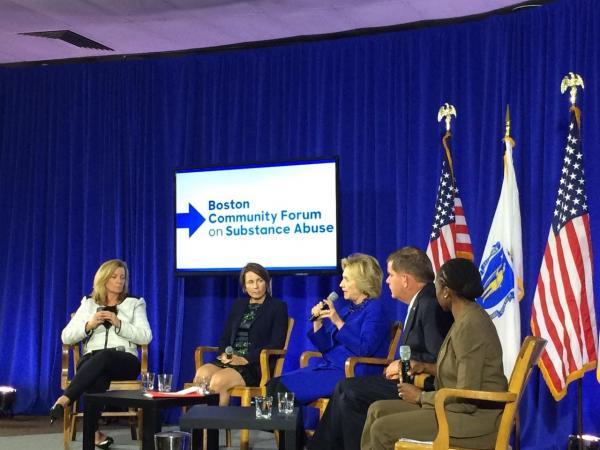October 2, 2015

Hillary Clinton, with Learn to Cope Founder Joanne Peterson, Mass. AG Maura Healey, Mayor Walsh, and CEO of The Dimock Center Myechia Minter-Jordan. Photo by Maddie Kilgannon
Democratic presidential candidate Hillary Clinton leveled a rebuke at opioid prescription practices at a forum Thursday, and joined Attorney General Maura Healey and Mayor Martin Walsh in critically addressing the opioid “epidemic” sweeping the nation.
As the Clinton campaign rolled through Boston, the former first lady and Secretary of State hosted a forum on drug abuse and treatment at the Boston Teachers Union in Dorchester. The forum, packed with individuals impacted by drug abuse through loved ones or personal experience, was the third Clinton has hosted.
"When I started running for president, I didn't know this would become an issue that'd be at the top of my priority list until I got out there and listened," Clinton said Thursday. Her substance abuse plan pledges $10 billion -- $7.5 billion to be allocated on a state level -- of support for multiple facets of treatment including education for youths and health practitioners alike.
Treatment options should be readily available, Clinton said, and all first responders should be equipped with and trained to administer Narcan. The overdose-reversing drug has been implemented in a number of first responder programs, due in large part to Healey’s advocacy, Clinton said.
The three politicians acknowledged that there was no silver bullet for the problem, which Clinton linked to an increase in prescribing heavy painkillers and corresponding addictions to the drugs. She singled out the Food and Drug Administration’s regulation of opioid prescriptions.
“We have got to take another look at the ease with which the opioids are being prescribed," she said. "I am very concerned that the FDA has approved a form of opioids for children. And I find that absolutely incomprehensible."
One effort Clinton lauded was the Gloucester Police’s “angel” program as an example for other police forces across the country. The program provides a haven for addicts who want to turn over drugs at the police station and be directed to treatment rather than face arrest.
Among the state representatives present was Rep. Ann-Margaret Ferrante, of Goucester. She read aloud text messages from Gloucester Police Chief Leonard Campanello, who oversees the “angel” program. "He said, 'Make sure Hillary Rodham Clinton knows that partners are great and we need partners, but what we truly need is a champion,’ ” Ferrante said. “So please, please, please be our champion.”
A national partner in the drug abuse fight is crucial, Healey and Walsh said, with Walsh asserting that Clinton “gets it.” The mayor is open about his history with alcoholism, and discussed local efforts to combat the problem, including creating the Office of Recovery Services. “I think it’s important for all of us today...to keep this conversation alive, because this conversation didn’t happen by accident,” he said.
Audience members shared struggles with addictions and the loss of loved ones to drugs. Calls for improved treatment options included considerations of alternative or holistic approaches. Largely, those at the meeting expressed their gratitude for seeing drug abuse brought to the national stage, along with efforts to combat what some said had been a scourge on their lives similar to the AIDS crisis.
Healey, who has championed improvements to drug treatment, is also a vocal supporter of Clinton. "We need a partner on the federal level, and there is no one now running for president of the United States of America who knows more about this issue or has a smarter, more effective plan than Hillary Clinton," Healey said.



